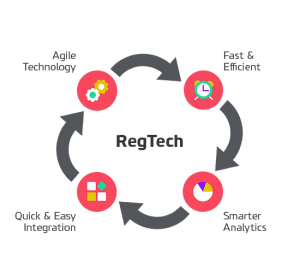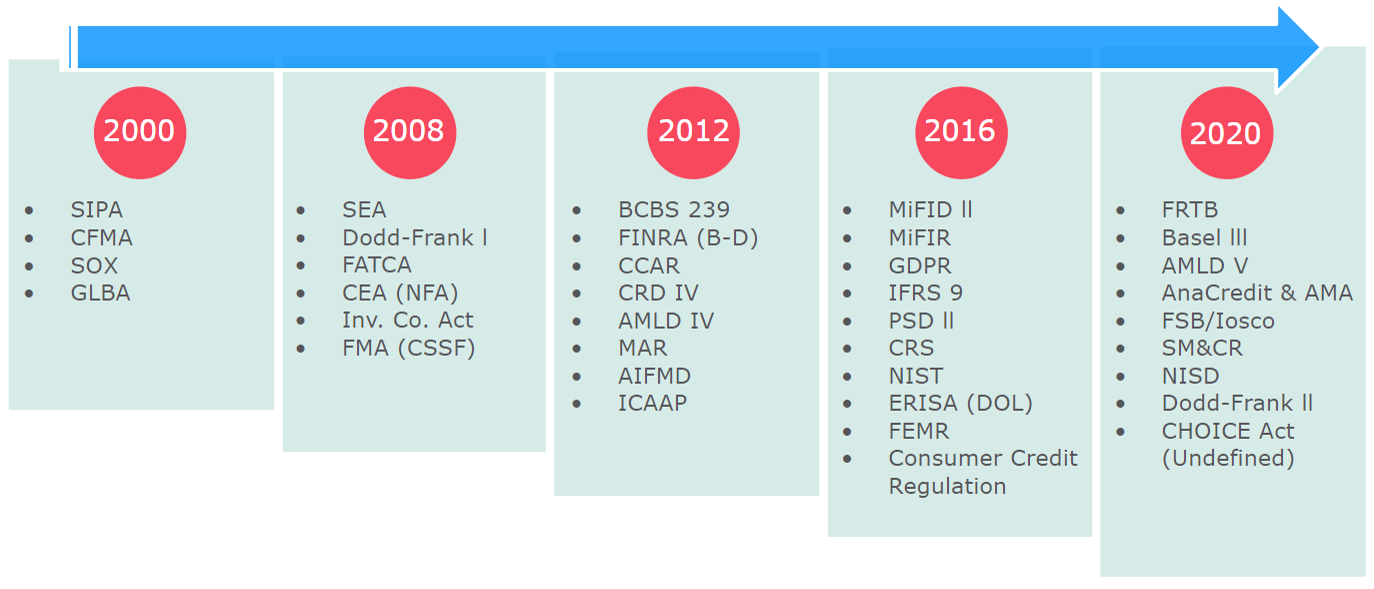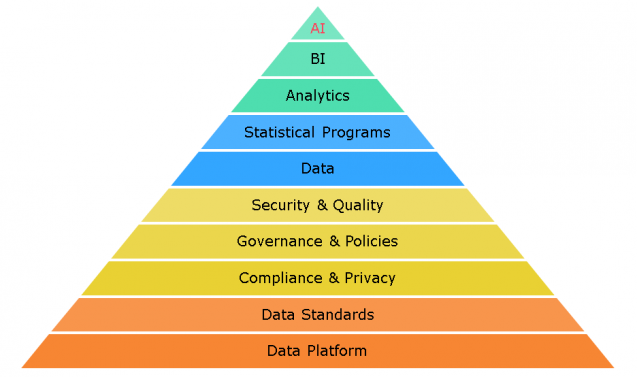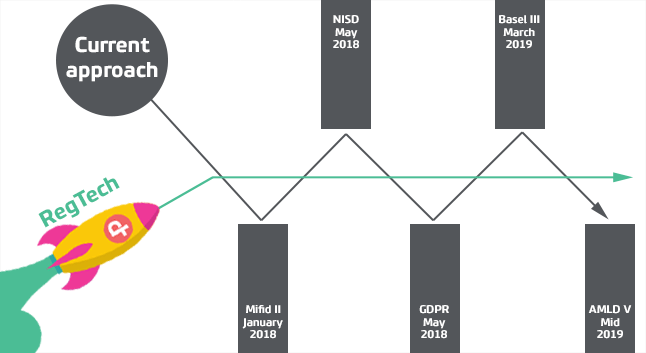“Data is the new gold” is not only an apt portrait of the value of data, but also of its weight: Governments have ever-increasing data requirements for organizations to enforce compliance in practice. Managing these escalating regulatory demands in an ad hoc manner is no longer practical. As a result we believe in designing strategic data ecosystems that power the artificial intelligence necessary to cope and prosper through regulatory demands. Devoteam is promoting its view on regulatory technology (RegTech) as a manner of not only managing external data requirements in the fastest, most effective, and most cost-efficient manner, but also as an impetus to improve corporate data governance that enhances decision-making and grows competitive advantage.
Common (ineffectual) approaches to data legislation
Regulations such as the looming European General Data Protection Regulation (GDPR) or the recently broadened Markets in Financial Instruments Directive (MiFID II) are generally incorporated in a siloed, ad hoc manner. When and where appropriate data governance processes appear to be missing, functionality is added with the use of applications or processes – a reactive measure. In this manner, new data is usually collected in an ad hoc manner, and governance is set up in response to new legislative demands on an ad hoc basis, rather than as part of a strategic proactive effort.

Ad hoc approaches to regulatory demands are troublesome, given the ever-increasing complexity of regulators’ demands, changing regulatory attitudes, and the overwhelming increase in compliance regulations and data requirements in general; whereas until around 2008 regulators had a largely laissez-faire and collaborative approach to compliance, changing government attitudes and behaviors have led to rapidly increasing and cumulative strict regulatory demands. Non-compliance is no longer a slap on the proverbial wrist, but instead a heavy blow that can put smaller firms out of business, not to mention the consequences of reputation damage. Also, while there is a lot of focus on regulations such a GDPR and MiFID II, these are just examples of what will come to pass, as there are numerous additional extensive regulations on the horizon, each of which will stack cumulatively on existing regulation and requirements. Firms that operate internationally might even have to deal with multiple and varied interpretations to the same legislation.
Engaging with data requirements and governance in an ad hoc manner will soon not only be unwise, but also impractical. This is because adding additional approaches to regulations on top of the existing approaches is ineffectual, too expensive and leads to inflexible handling (considering future regulations) of data regulation. Building regulatory silos to deal with specific pieces of legislation is not only expensive and complex, but also strategically unwise, considering the broader picture of changing government attitudes, severe costs and risks to non-compliance.
Managing data regulation and legislation: Take a proactive and productive approach with RegTech
Instead, we believe new (legislative) data demands can be an incentive for better data governance, which can also be put to productive use. By taking a strategic approach to data processes, a business can not only meet direct ad hoc needs, but leverage these processes simultaneously to increase business performance.

Figure 1: Courtesy Subas Roy, Chair of the IRTA
Powering strategic business decisions with data
The questions that firms should be asking are, what are our strategic requirements for data? What data will lead to the intelligent insights that create the best corporate decisions, optimized revenues, and organizational effectiveness? More generally, what data will lead to the data-driven approach that best informs internal and external functions based on strategic corporate goals?
Such questions point at a holistic approach towards data governance – one that emphasizes corporate strategic goals, and the data that is required to accomplish those goals.

Figure 2: Derived from work by Linda Powell, CDO at the CFPB
Whereas most data approaches start with master data systems, we believe that the best information is created from data that is crafted and selected from the ground up, starting with business strategy rather than individual applications and specific solutions. Working from corporate strategy, data intake needs should be defined in terms of required and desired scope, resolution, texture, structure, and availability. Based on that foundation, quality assurances should be built to create the required accuracy, precision, and data definitions. Building on this approach one arrives at a dataset that can be further molded for governance, security requirements, and user access templates.
RegTech and Artificial Intelligence
Having designed such a strategic data ecosystem, specific cross-cuts are made for business intelligence dashboards, advanced analytics, and automated derived versions thereof in the form of artificial intelligence as to leverage the appropriate business insights as part of business processes. To get the required artificial intelligence to interact with or even constitute business processes, a greybox approach is essential (as discussed in this previous blog on InsurTech). By having the right strategic data ecosystem that can feed the appropriate insights, an enterprise wide RegTech solution can be set up that can manage continuous change, multiple (overlapping) requirements, and cumulative complexity. Regulatory solutions need to be more cost-effective and significantly faster to implement. Building on a strong and flexibly designed data foundation, changes and additions can be implemented with a minimal impact to business processes.

Competitive advantage with Devoteam’s approach
By taking our RegTech approach, one can deal comprehensively with current increasing and cumulative regulatory demands, where Devoteam leverages numerous years being an authority in data integration and architecture, in addition to its deep expertise in artificial intelligence. Building on a built-for-purpose strategic data ecosystem that powers the data-driven organization, with the data quality and consistency processes that allow for both required and productive governance processes. Through our RegTech approach, organizations can face current and future regulatory requirements, and take the opportunity to leverage organizational strategy.
Also check out our related case study, blogs and white papers:
- Digital disruption in the insurance industry: Leveraging big data with flexible “greybox” algorithms
- White Paper “GDPR Action Plan: The road to compliance”
For questions about this blog you are able to contact Marc Bovy, Manager Data & Analytics at Devoteam Netherlands (marc.bovy@devoteam.com). More about this subject? Visit our Customer Experience offer page.